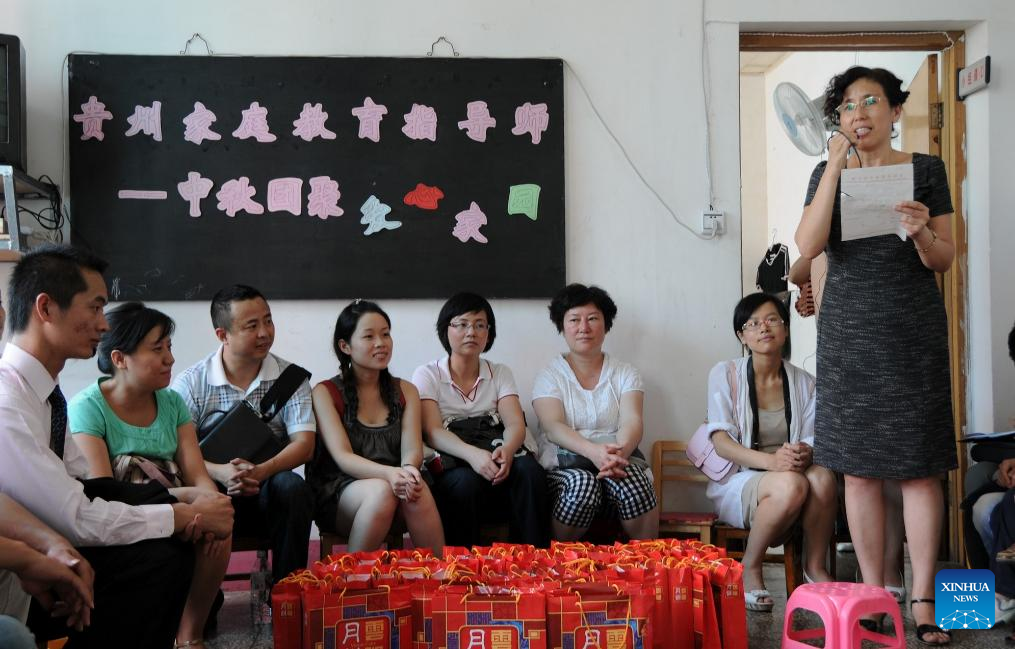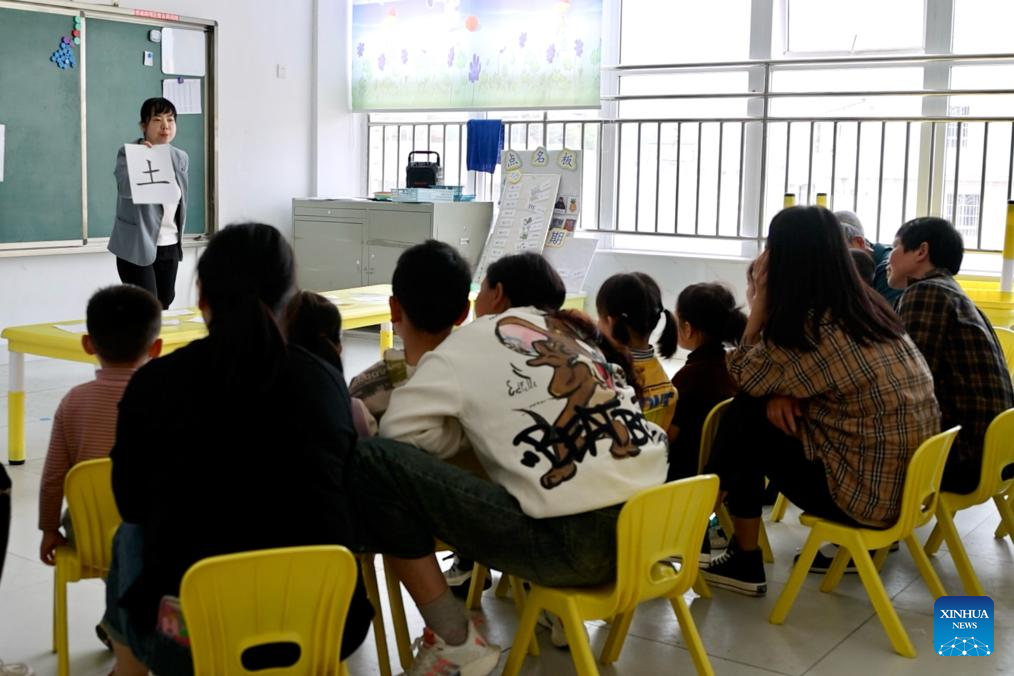
This file photo taken on Sept. 21, 2010 shows Zhao Xinling (1st R) speaking during a care event for children with autism at the "Loving Home for Children" Special Education and Rehabilitation Center in Guiyang, capital of southwest China's Guizhou Province. (Xinhua/Li Jingya)
by Xinhua writers Lu Yifan, Li Jingya and Wu Siyang
GUIYANG, April 2 (Xinhua) -- Zhao Xinling likes to tell her son, whom she affectionately calls Hao Hao, one particular story: At bedtime, a little hare asks a big hare to guess how much he loves him, and the little hare says, "I love you all the way to the moon."
"I tell my son, 'Mom loves you, from here to the stars,'" said Zhao. "Although I have been teaching him how to say 'mom' every day, he is still unable to say the word. He is now 24 years old."
Like many parents of children with autism, Zhao, 64, has faced challenges and worked hard to help her son since he was diagnosed with severe autism at a very young age.
She is the founder and principal of the "Loving Home for Children" Special Education and Rehabilitation Center in Guiyang, capital of southwest China's Guizhou Province. It is the first autism rehabilitation training institution in the province, and Zhao is also a teacher there.
Over the years, she has provided support to more than 7,000 children with autism. She has witnessed the autistic community flourish -- from being underrecognized to being increasingly understood and accepted -- and she has seen how the community is gaining more support from broader society.
Autism is a neurodevelopmental disorder characterized by varying degrees of impairment in communication skills and social interactions. Children with autism are sometimes called "children of the stars" in China, as society often perceives them as lonely and they can exhibit unconventional emotional reactions, language abilities or social skills.
This year's World Autism Awareness Day falls on Tuesday. A report on autism education showed that in 2019, there were more than 10 million people with an autism spectrum disorder in China, among whom about 2 million were children aged under 12.
SEEKING HELP
Hao Hao, born in 2000, lost his language abilities suddenly when he was 22 months old. Autism was underrecognized in Guizhou at the time, and Zhao had to seek help for her son in other parts of the country.
In 2002, Hao Hao was diagnosed with autism. "Then, I was very confused and didn't know how to provide support for my son, or how to educate and provide rehabilitation training for him," Zhao said.
To gain a better understanding of autism and learn about rehabilitation for autistic children, she visited rehabilitation institutions, hospitals and schools in cities such as Beijing and Guangzhou.
"During that time, I met with parents of autistic children from across the country and realized that many families were under enormous pressure," she said.
While seeking medical treatment for her son, Zhao met Guan Fuqin, a doctor at the Guiyang Maternal and Child Health Care Hospital. Guan, now in her 90s, was among the first in Guizhou Province to provide autism diagnosis services for children.
"Guan advised me to establish an institution in Guizhou where children with autism could learn locally, and where their parents could help one another. She would act as a volunteer, offering support from a medical point of view," Zhao said.
Guan has been providing voluntary diagnosis and treatment services for children at the center for 20 years, as well as lectures and training for teachers and parents, Zhao noted.
In 2003, the "Loving Home for Children" Special Education and Rehabilitation Center was established, becoming the first rehabilitation and training institution in Guizhou to serve children with autism and other developmental disorders. In 2016, the center began providing services to adults with autism.
"The earlier the children with autism receive professional rehabilitation training, the better they will integrate into society in the future," Zhao said, noting that children aged zero to six who receive training at the center are entitled to government subsidies.
OFFERING HOPE
A mother in Guizhou's Yuqing County, who has chosen to be referred to by her surname, Peng, has a six-year-old daughter with autism. Her daughter was diagnosed at the age of four and has been receiving rehabilitation training at the center for more than two years.
"My daughter has become more talkative and cheerful, and is able to take care of herself to some extent. The government subsidy reduces the financial burden on my family and gives me the motivation to stick to it," Peng said.
Over the decades, China's autism rehabilitation training system has been improving constantly. In Guizhou, an early screening system for autism has been gradually established, and an increasing number of autism rehabilitation training services have been provided by institutions such as disabled persons' federations, hospitals and non-governmental organizations.
In 2006, Zhao began trying her hand at integrated education. She remembers that during a visit to a regular primary school to plant flowers and other greenery with the students there, she had asked the children which plant they thought was the most beautiful.
"The children said that this one is beautiful, and that one is also beautiful," she said. "I wanted to plant a seed in their hearts -- life is diverse and every unique life deserves to be respected."
"In the past, we wanted autistic children to improve themselves and fit into the lifestyles of neurotypical people. However, through integrated education, neurotypical children can learn to understand, accept and care for autistic children. These two-way efforts can make the lives of autistic children easier, and the families behind them happier," she said.
In 2022, the center moved to a four-story building on a new campus, with the local government providing rent subsidies and many people donating items such as office supplies, computers, tables and chairs.
Currently, some 300 people with autism are receiving services at the center every day. It has carried out integrated education practices with over 20 kindergartens, primary schools and high schools in Guiyang over the years, and more than 2,000 autistic children have been enrolled in regular schools.
"Although there are still many challenges ahead that need to be solved, I am confident about the future," Zhao said. "The parents of autistic children also need to emerge from their loneliness and take care that they don't close themselves off. We need to view autism positively, accept it, and enjoy the different life it offers." ■

Children with autism receive rehabilitation training at the "Loving Home for Children" Special Education and Rehabilitation Center in Guiyang, capital of southwest China's Guizhou Province, March 27, 2024. (Xinhua/Wu Siyang)



